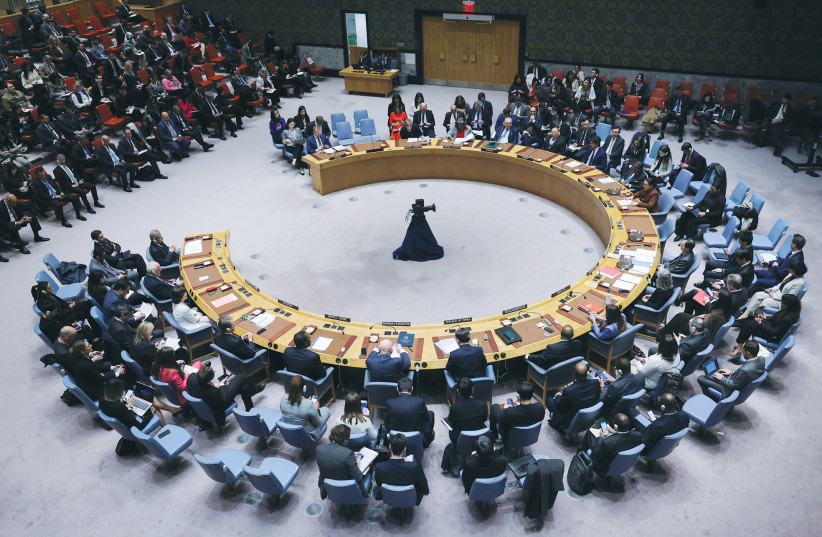A decisive Iranian response to the killing of Hamas leader Ismail Haniyeh on its sovereign territory is an execution of the Islamic Republic’s right to self-defense, the country’s envoy Amir Saeid Iravani told the UN Security Council on Wednesday.
“The Islamic Republic of Iran reserves its inherent right to self-defense in accordance with international law to respond decisively to these terrorist and criminal acts when it deems necessary and appropriate,” Iravani said.
He spoke after The New York Times reports that Iran planned a direct attack against Tel Aviv and Haifa.
Israel has not claimed responsibility for the targeted assassination of Haniyeh Wednesday morning but did take credit for killing Hezbollah commander Fuad Shukr.
Haniyeh’s assignation in Tehran was an “aggressive act of terrorism” and a “grave breach” of Iranian “sovereignty,” Iravani said as he called on the UN Security Council to sanction Israel.

Condemning the killings
The meeting held at UN headquarters in New York was called by two of the council's 15 members, China and Algeria, at Iran’s request.
China’s Ambassador Fu Cong condemned Haniyeh’s killing.
“This act was a blatant attempt to sabotage peace efforts and wrongfully trampled on the fundamental UN Charter principle of respect for sovereignty and territorial integrity of all states.
“China is deeply worried about an exacerbation of the upheaval in the region that this incident may trigger the Gaza conflict has been going on for nearly 300 days,” he said.
“The Middle East situation is hanging by a threat much to the concern of the international community,” the Chinese envoy stated.
A Russian envoy condemned the attack, noting that it was a serious attempt to derail talks to secure the release of the remaining 115 hostages of which Haniyeh was a critical participant. "Those who were behind this political assassination must have known how dangerous the consequences would have been for the entire region," he told the Security Council.
"These attempts to drag Iran into a regional confrontation destabilize an atmosphere in the region that is already at a boiling point," he said, explaining that assassinations were "bringing the Middle East to the brink of a regional war."
The US took no part
US Ambassador Robert Wood spoke in support of Israel. “I want to be very clear about this – Israel has a right to defend itself against attacks from Hezbollah and other terrorists.”
The United States was not involved in the July 30 attack that killed Shukr, he said. Nor, he explained, was it part of the attack against Haniyeh.
Wood urged the Security Council to act against Hezbollah, whose attacks against Israel have displaced more than 100 civilians on either side of the Israeli-Lebanese border.
“We call on the Security Council to send an unambiguous message to Hizballah by standing with Israel as it defends itself against Hizballah’s repeated attacks,” Wood said.
The UN Security Council should hold Iran accountable for violating its resolutions, he stated.
He downplayed the danger facing Israel,
stating: “A broader war is neither imminent nor inevitable, although the opportunistic attacks by Iran and its network of terrorist proxies and partners across the region have repeatedly brought us closer to a regional conflict.”
The US will continue to work for a diplomatic resolution, which starts with a hostage deal, he explained. His country, he said, would continue to work with mediating nations Qatar and Egypt to secure a deal.
“We encourage members of this Council with direct influence over Iran to increase pressure on it to stop escalating its proxy conflict against Israel and other actors,” he stated.
UN Security Council convened a special session at Iran's request. Deputy Ambassador of Israel to the UN, Jonathan Miller, stated at the meeting: “The blood of innocent children in Majdal Shams and of the victims of the October 7th massacre” was shed by “Tehran's ruthless ambitions”; “We demand that this Council moves to condemn Iran for its continued support of regional terrorism and increase its sanctions on Tehran. It must also list the Iranian Revolutionary Guards as a terrorist organization.”
Israeli Deputy Ambassador to the UN, Jonathan Miller, noted that Shukr was responsible for the strike in the Golan.
Iran and its regional terror operations
Miller called on the council to impose sanctions on Iran and ensure that Hezbollah withdraws to the Litani River as laid out in the UNSC Resolution that codified the ceasefire deal that ended the Second Lebanon War, he said.
“We … demand that this Council moves to condemn Iran for its continued support of regional terrorism and increase its sanctions on Tehran.
“It must also list the Iranian Revolutionary Guards as a terrorist organization as it continues to lead and coordinate attacks across the Middle East and the world,” Miller said.
"Iran has used its proxies to attack Israel from every direction," he said. “We will defend ourselves and respond with great force against those who try and harm us.”
“The world must support us at this time,” he added.
